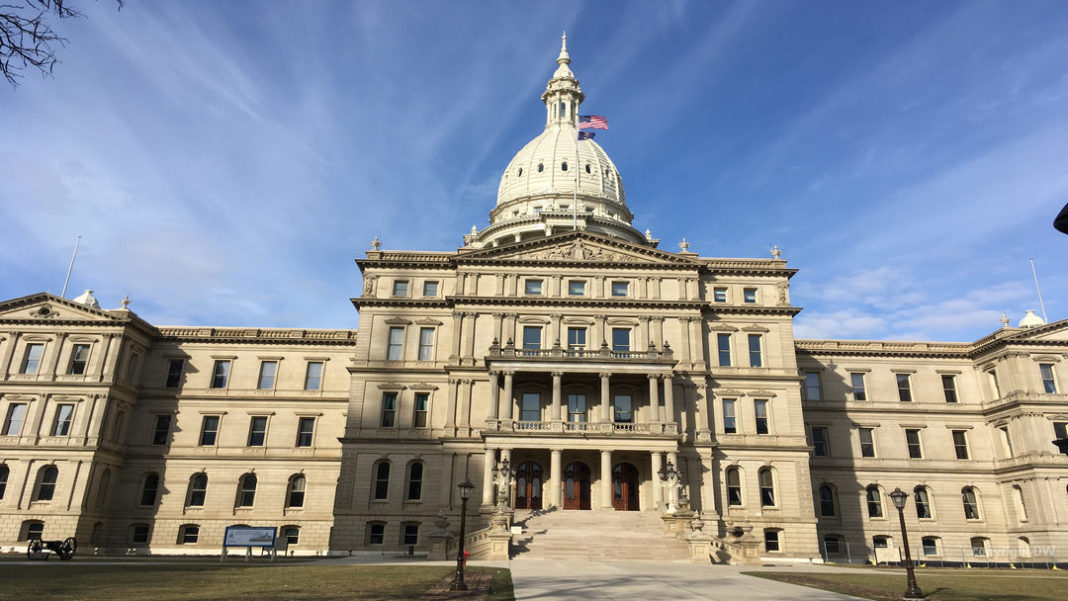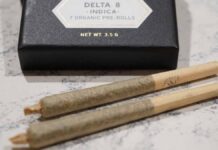STATE OF MICHIGAN
99TH LEGISLATURE
REGULAR SESSION OF 2018
Introduced by Reps. Lauwers, Johnson, Barrett, Cole and Miller
ENROLLED HOUSE BILL No. 6330
AN ACT to amend 2014 PA 547, entitled “An act to authorize the growing and cultivating of industrial hemp for research purposes; to authorize the receipt and expenditure of funding for research related to industrial hemp; and to prescribe the powers and duties of certain state agencies and officials and colleges and universities in this state,” by amending the title and sections 1, 2, 3, and 4 (MCL 286.841, 286.842, 286.843, and 286.844) and by adding sections 5, 6, 7, 8, 9, 10, 11, 12, 13, 14, 15, 16, 17, 18, and 19.
The People of the State of Michigan enact:
TITLE
An act to authorize the growing and cultivating of industrial hemp for research and development purposes; to require and provide for the registration and licensing of certain persons engaged in the growing, processing, and handling of industrial hemp; to provide for the collection of fees; to authorize the receipt and expenditure of funding for research and development related to industrial hemp; to prescribe the powers and duties of certain state agencies and officials and colleges and universities in this state; and to provide for certain fines and sanctions.
Sec. 1. This act shall be known and may be cited as the “industrial hemp research and development act”.
Sec. 2. As used in this act:
(a) “Broker” means to engage or participate in the marketing of industrial hemp by acting as an intermediary or negotiator between prospective buyers and sellers.
(b) “Cannabis” means the plant Cannabis sativa L. and any part of that plant, whether growing or not.
(c) “Department” means the department of agriculture and rural development.
(d) “Director” means the director of the department, or his or her designee.
(e) “GPS coordinates” means latitude and longitude coordinates derived from a global positioning system.
(f) “Grow” means to plant, propagate, grow, cultivate, or harvest live plants or viable seeds.
(g) “Grower” means a person registered by the department under this act to grow industrial hemp.
(h) “Handle” means to possess, store, or transport industrial hemp on premises owned, operated, or controlled by a registered grower or licensed processor-handler.
(i) “Industrial hemp” means the plant Cannabis sativa L. and any part of that plant, including the viable seeds of that plant and all derivatives, extracts, cannabinoids, isomers, acids, salts, and salts of isomers, whether growing or not, with a delta-9-tetrahydrocannabinol concentration of not more than 0.3% on a dry weight basis. Industrial hemp includes industrial hemp commodities and products and topical or ingestible animal and consumer products derived from the plant Cannabis sativa L. with a delta-9-tetrahydrocannabinol concentration of not more than 0.3% on a dry weight basis.
(j) “Licensing and registration fund” means the industrial hemp licensing and registration fund created in section 5.
(k) “Location ID” means the unique identifier established by the applicant for each unique set of GPS coordinates where industrial hemp will be grown, handled, stored, processed, or brokered.
(l) “Market” means to promote or sell industrial hemp or an industrial hemp commodity or product. Market includes, but is not limited to, efforts to advertise and gather information about the needs or preferences of potential consumers or suppliers.
(m) “Nonviable seed” means seed that has been crushed, dehulled, heat treated, or otherwise rendered to have a 0.0% germination rate.
(n) “Person” means an individual, partnership, corporation, association, or other legal entity.
(o) “Plot” means a contiguous area in a field, greenhouse, or indoor growing structure containing the same variety of industrial hemp throughout the area.
(p) “Process” means to convert raw industrial hemp into a marketable form.
(q) “Processor-handler” means a person licensed by the department under this act to process, handle, broker, or market industrial hemp.
(r) “Program” means the industrial hemp licensing and registration program established by this act.
(s) “Propagule” means a plant or plant part that is utilized to grow a new plant.
(t) “Research fund” means the industrial hemp research and development fund created in section 4.
(u) “Testing facility” means a safety compliance facility licensed under the medical marihuana facilities licensing act, 2016 PA 281, MCL 333.27101 to 333.27801, or a testing facility approved by the department.
(v) “THC” means tetrahydrocannabinol.
(w) “Variety” means a subdivision of a species that has the following characteristics:
(i) The subdivision is uniform, in the sense that variations between the subdivision and other subdivisions in essential and distinctive characteristics are describable.
(ii) The subdivision is distinct, in the sense that the subdivision can be differentiated by 1 or more identifiable morphological, physiological, or other characteristics from all other known subdivisions.
(iii) The subdivision is stable, in the sense that the subdivision will remain uniform and distinct if reproduced.
(x) “Viable seed” means seed that has a germination rate of greater than 0.0%.
(y) “Volunteer cannabis plant” means a cannabis plant that is not intentionally planted and grows of its own accord from seeds or roots in the years following an intentionally planted cannabis crop.
Sec. 3. (1) The department or a college or university in this state may grow or cultivate, or both, industrial hemp for purposes of research conducted under an agricultural pilot program or other agricultural or academic research project.
(2) The department or a college or university that transports industrial hemp as part of a research project authorized under this act shall include along with a shipment of industrial hemp a letter on the department’s or the college’s or university’s letterhead that provides notice that the shipment includes industrial hemp authorized under this act.
(3) A college or university in this state may receive direct grants from the federal government or any other source for the purpose of conducting research authorized under this act.
Sec. 4. (1) The industrial hemp research and development fund is created within the state treasury.
(2) The state treasurer may receive money or other assets from any source for deposit into the research fund, including federal research grants. The state treasurer shall direct the investment of the research fund. The state treasurer shall credit to the research fund interest and earnings from research fund investments.
(3) Money in the research fund at the close of the fiscal year shall remain in the research fund and shall not lapse to the general fund.
(4) The department shall be the administrator of the research fund for auditing purposes.
(5) The department shall expend money from the research fund, upon appropriation, only for 1 or more of the following purposes:
(a) Research into growing or cultivating, or both, industrial hemp.
(b) Providing grants to colleges or universities in this state to conduct research into growing or cultivating, or both, industrial hemp.
Sec. 5. (1) The department shall establish, operate, and administer an industrial hemp licensing and registration program.
(2) The industrial hemp licensing and registration fund is created within the state treasury.
(3) The state treasurer may receive license and registration fees and administrative fines under this act for deposit into the licensing and registration fund. The state treasurer may also receive money or other assets from any other source for deposit into the licensing and registration fund. The state treasurer shall credit to the licensing and registration fund interest and earnings from licensing and registration fund investments.
(4) The department shall expend money from the licensing and registration fund to establish, operate, and enforce the licensing and registration program created under this act.
(5) Money in the licensing and registration fund at the close of the fiscal year shall remain in the licensing and registration fund and shall not lapse to the general fund.
(6) The department shall be the administrator of the licensing and registration fund for auditing purposes.
Sec. 6. (1) Except as otherwise provided under this act for a college or university in this state, a person shall not grow industrial hemp in this state unless the person is registered as a grower under this act. A person other than a college or university in this state that wishes to grow industrial hemp in this state shall submit the registration application fee provided under section 16, and register with the department on a form as prescribed by the department that includes, but is not limited to, the following:
(a) The applicant’s full name, birth date, mailing address, telephone number, and valid and monitored electronic mail address. If the applicant is a person that is not an individual, the full name of each officer and director, and partner, member, or owner owning in excess of 10% of equity or stock, including his or her birth date, title, and valid and monitored electronic mail address.
(b) The proposed acreage and greenhouse or other indoor square footage to be planted.
(c) The street address, location ID, and GPS coordinates for each field, greenhouse, building, or other site where industrial hemp will be grown, handled, or stored.
(d) Maps depicting each field, greenhouse, building, or other site where industrial hemp will be grown, handled, or stored, with appropriate indications for entrances, field boundaries, and specific locations corresponding to the GPS coordinates provided under subdivision (c).
(e) If applicable, a request by the applicant that a grower registration issued to the applicant include a designation authorizing the applicant to sell harvested industrial hemp to a processor licensed under the medical marihuana facilities licensing act, 2016 PA 281, MCL 333.27101 to 333.27801, as prescribed under section 10(6).
(2) An initial grower registration application may be submitted at any time. An initial grower registration issued by the department expires at midnight on November 30 in the year in which it is issued.
(3) Other than an initial grower registration, a grower registration is valid for 1 year beginning on December 1 and expiring at midnight on the following November 30 each year.
(4) An application to renew an existing grower registration shall be postmarked on or before November 30. An application submitted after November 30 is subject to a late fee of $250.00.
(5) An application and supporting documents submitted to the department under this section are exempt from disclosure under the freedom of information act, 1976 PA 442, MCL 15.231 to 15.246.
Sec. 7. (1) Except as otherwise provided under this act for a college or university in this state, and except for a processor licensed under the medical marihuana facilities licensing act, 2016 PA 281, MCL 333.27101 to 333.27801, or a testing facility, a person shall not process, handle, broker, or market industrial hemp in this state unless the person is licensed as a processor-handler under this act. A person other than a college or university in this state that wishes to process, handle, broker, or market industrial hemp in this state shall submit the license application fee provided under section 16 and apply to the department for a processor-handler license on a form as prescribed by the department that includes, but is not limited to, the following:
(a) The applicant’s full name, date of birth, mailing address, telephone number, and valid and monitored electronic mail address. If the applicant is a person that is not an individual, the full name of each officer and director, and partner, member, or owner owning in excess of 10% of equity or stock, including his or her birth date, title, and valid and monitored electronic mail address.
(b) The street address, location ID, and GPS coordinates for each building or site where industrial hemp will be processed, handled, stored, or brokered.
(c) Maps depicting each building, or other site where industrial hemp will be processed, handled, stored, or brokered with appropriate indications for entrances and specific locations corresponding to the GPS coordinates provided under subdivision (b).
(2) An initial processor-handler license application may be submitted at any time. An initial processor-handler license issued by the department expires at midnight on November 30 in the year in which it is issued.
(3) Other than an initial processor-handler license, a processor-handler license is valid for 1 year beginning on December 1 and expiring at midnight on the following November 30 each year.
(4) An application to renew an existing processor-handler license shall be postmarked on or before November 30. An application submitted after November 30 is subject to a late fee of $250.00.
(5) An application and supporting documents submitted to the department under this section are exempt from disclosure under the freedom of information act, 1976 PA 442, MCL 15.231 to 15.246.
Sec. 8. (1) The department shall approve or deny a registration or license application submitted under this act in a timely manner. The department shall deny a registration or license application if the application is incomplete or if any of the following apply:
(a) The applicant is under the age of 18.
(b) The applicant’s growing, handling, storage, processing, or brokering sites are not located in this state.
(c) The applicant has not demonstrated, as determined by the director, a willingness to comply with the department’s rules, instructions from the department, or instructions from a law enforcement agency.
(d) The applicant has unpaid fees, fines, or civil penalties owed to this state under this act.
(e) The applicant has made false statements or representations, as determined by the director, to the department or a law enforcement agency.
(f) The applicant has had a grower registration or processor-handler license revoked in the 5 years preceding the date of application.
(2) If the application is denied because it is incomplete, the department shall notify the applicant in writing within a timely manner after the department receives the application describing the deficiency and requesting additional information.
Sec. 9. (1) If the department denies a registration or license application under this act, the department shall notify the applicant of the denial in writing by letter or electronic mail.
(2) An applicant may appeal a denial of his or her registration or license application by submitting to the department a written request for a hearing. The applicant shall submit the request to the department not more than 15 days after the date of the denial.
(3) The department shall conduct a hearing requested under this section in accordance with the administrative procedures act of 1969, 1969 PA 306, MCL 24.201 to 24.328.
Sec. 10. (1) A grower consents to all of the following:
(a) Entry onto, and inspection of, all premises by the department or law enforcement agencies, with or without cause, and with or without advance notice, where industrial hemp or industrial hemp cultivation equipment or materials are located, or to be located.
(b) Testing of samples of cannabis material in possession of the grower by a testing facility. The fee for testing under this subdivision shall be limited to reasonable costs of conducting the testing.
(c) Forfeiture and destruction of any of the following, without compensation:
(i) Cannabis found to have a measured delta-9-THC content greater than 0.3% on a dry weight basis.
(ii) Industrial hemp present at a location that is not included in the grower’s registration.
(iii) Industrial hemp that is grown, handled, or stored in a manner that violates this act.
(d) The risk of financial or other loss under this act is borne solely by the grower.
(2) A grower shall not do any of the following:
(a) Grow, handle, or store industrial hemp for purposes other than research into the growing of industrial hemp.
(b) Handle or store industrial hemp not grown under the authority of his or her grower registration unless licensed as a processor-handler.
(c) Grow, handle, or store industrial hemp in a location other than a location listed in his or her grower registration.
(d) Grow, handle, or store industrial hemp on land or within a structure that is not owned or completely controlled by the grower.
(e) Interplant industrial hemp with any other crop without express written permission from the department. As used in this subdivision, “interplant” means to plant a crop of industrial hemp together with a crop that is not industrial hemp on a single plot of land.
(f) Sell or transport, or permit the sale or transport of, living industrial hemp plants, viable industrial hemp seeds, industrial hemp leaf material, or industrial hemp floral material to a location not listed in his or her registration or to a person in this state who is not a registered grower or licensed processor-handler.
(3) A grower shall post signage in a conspicuous location at each boundary line of a growing location. The signage shall include the following:
(a) The statement, “Industrial Hemp Registered with the Michigan Department of Agriculture and Rural Development”.
(b) The registered grower’s name.
(c) The registered grower’s registration number.
(4) Upon request from the department or a law enforcement agency, immediately produce a copy of his or her registration for inspection.
(5) A grower may transfer up to 2-1/2 ounces of industrial hemp per transfer to a testing facility for the purpose of measuring THC, cannabidiol, or other phytocannabinoid levels.
(6) A grower may sell harvested industrial hemp to a processor licensed under the medical marihuana facilities licensing act, 2016 PA 281, MCL 333.27101 to 333.27801. If a grower intends to sell harvested industrial hemp to a processor described in this subsection, the grower must apply for that designation on his or her grower registration application. Before selling harvested industrial hemp to a processor described in this subsection, the grower shall enter the sale into the seed-to-sale tracking system established under section 3 of the marihuana tracking act, 2016 PA 282, MCL 333.27903.
Sec. 11. (1) A processor-handler consents to all of the following:
(a) Entry onto, and inspection of, all premises by the department or law enforcement agencies, with or without cause, and with or without advance notice, where industrial hemp or industrial hemp processing equipment or materials are located or to be located.
(b) Collection by the department of samples of cannabis material in possession of the processor-handler at any time.
(c) Forfeiture and destruction of any of the following, without compensation:
(i) Cannabis found to have a measured delta-9-THC content greater than 0.3% on a dry weight basis.
(ii) Industrial hemp that is processed, handled, stored, or brokered in a manner that violates this act.
(iii) Live industrial hemp plants unless the processor-handler is also registered as a grower.
(d) The risk of financial or other loss under this act is borne solely by the processor-handler.
(2) A processor-handler shall not sell or transport, or permit the sale or transport of, viable industrial hemp seeds, industrial hemp leaf material, or industrial hemp floral material to a location not listed in his or her current license or to a person in this state who is not a registered grower or licensed processor-handler.
(3) Upon request from the department or a law enforcement agency, a processor-handler shall immediately produce a copy of his or her license for inspection.
(4) A processor-handler may transfer up to 2-1/2 ounces of industrial hemp per transfer to a testing facility for the purpose of measuring THC, cannabidiol, or other phytocannabinoid levels.
Sec. 12. (1) If any of the following allegations are made concerning a registered grower or licensed processor-handler, the department shall suspend his or her registration or license for not more than 60 days:
(a) The registered grower or licensed processor-handler intentionally grew or was in possession of cannabis with a delta-9-THC content greater than 0.3% on a dry weight basis.
(b) The registered grower or licensed processor-handler violated a provision of this act.
(c) The registered grower or licensed processor-handler made a false statement, as determined by the department, to the department or a law enforcement agency.
(d) The registered grower or licensed processor-handler failed to comply with an instruction or order from the department or a law enforcement agency.
(2) If the department suspends a registration or license, the department shall notify the registered grower or licensed processor-handler in writing that his or her registration or license has been suspended.
(3) A person whose grower registration has been suspended under this section shall not harvest or remove industrial hemp from the premises where industrial hemp was located at the time the department issued its notice of suspension, except as authorized in writing by the department.
(4) A person whose processor-handler license has been suspended under this section shall not process or remove industrial hemp from the premises where industrial hemp was located at the time the department issued its notice of suspension, except as authorized in writing by the department.
Sec. 13. (1) The department shall not permanently revoke a registration or license suspended under section 12 unless the department has notified the registered grower or licensed processor-handler of the allegation against him or her and given the registered grower or licensed processor-handler an opportunity for a hearing to appeal the revocation.
(2) The department shall schedule a registration or license revocation hearing for a date as soon as practicable that is not more than 60 days after the date of notification of a registration or license suspension.
(3) The department shall conduct the hearing required under this section in accordance with the administrative procedures act of 1969, 1969 PA 306, MCL 24.201 to 24.328.
(4) If the director finds by a preponderance of the evidence that an allegation under section 12(1) concerning the person subject to the registration or license revocation hearing is true, the director shall revoke the registration or license effective immediately and the department or a law enforcement agency shall order destroyed, or confiscate, all cannabis that is in the person’s possession.
(5) The department or a law enforcement agency shall not owe compensation or indemnity for the value of the cannabis that is destroyed or confiscated under this section.
(6) A person whose registration or license has been revoked is barred from participation in the program in any capacity for a minimum of 5 years from the date on which the registration or license was revoked.
(7) If the director does not find by a preponderance of the evidence that an allegation under section 12(1) concerning the person subject to a registration or license revocation hearing is true, the department shall lift the suspension imposed under section 12 within 24 hours.
Sec. 14. (1) A grower that intends to harvest or destroy an industrial hemp crop shall schedule a test of a sample of the crop by a testing facility, and the testing facility shall test the sample not less than 15 days before the intended harvest or destruction date.
(2) A grower who harvests or destroys a crop before receiving the results of testing under this section is subject to suspension and revocation of his or her registration.
(3) The testing facility shall measure the THC concentration of each sample collected under this section. The following apply to the THC test results:
(a) If the result of the THC test indicates a delta-9-THC concentration of less than 0.3% on a dry weight basis, the testing facility shall provide to the grower and to the department a certified report stating that result.
(b) If the result of the THC test indicates a delta-9-THC concentration that is equal to or greater than 0.3% on a dry weight basis, the grower may destroy the crop or repeat the testing an additional 2 times. The testing facility shall provide to the grower and to the department a certified report stating the result of each test performed under this subdivision.
(c) If a third THC test under this subsection indicates a delta-9-THC concentration that is equal to or greater than 0.3%, the testing facility shall provide to the grower and to the department a certified report stating that result and the department or a law enforcement agency shall order destroyed, or confiscate, all cannabis that is in the grower’s possession.
(4) The department shall establish rules for testing under this section in accordance with the administrative procedures act of 1969, 1969 PA 306, MCL 24.201 to 24.328.
(5) An individual who allows a falsified sample of an industrial hemp crop to be taken by a testing facility under this section is guilty of a felony and shall be imprisoned for not less than 1 year or more than 2 years and shall be fined $5,000.00.
Sec. 15. (1) Before implementing an alteration to a site listed in a grower’s registration, the grower shall submit a site modification request form, as prescribed by the department, and the required fee, as provided in section 16, based on the number of requested alterations and obtain written approval from the department.
(2) The department shall not approve a site modification request under this section unless the grower has paid the site modification fee in full.
Sec. 16. (1) An applicant for a grower registration or processor-handler license, or a registered grower or licensed processor-handler, under this act is subject to the following fees, as applicable:
(a) A grower registration fee of $100.00.
(b) A processor-handler license application fee of $1,350.00.
(c) A site modification fee of $50.00 for each alteration to a site listed in a grower registration after the registration has been issued.
(2) All fees under this act shall be paid with a check or money order payable to the department within 15 days of invoice.
(3) A fee required under this section is nonrefundable.
Sec. 17. (1) A person who individually, or by the action of his or her agent or employee, or as the agent or employee of another, violates this act or a rule promulgated under this act is subject to an administrative fine. Upon the request of a person to whom an administrative fine is issued, the director shall conduct a hearing in accordance with the administrative procedures act of 1969, 1969 PA 306, MCL 24.201 to 24.328. The department shall impose a fine authorized by this section as follows:
(a) For a first violation, not less than $100.00 or more than $500.00, plus actual costs of the investigation and double the amount of any economic benefit associated with the violation.
(b) For a second violation within 5 years after the first violation, not less than $500.00 or more than $1,000.00, plus actual costs of the investigation and double the amount of any economic benefit associated with the violation.
(c) For a third or subsequent violation within 5 years after the date of the first violation, not less than $1,000.00 or more than $2,000.00, plus actual costs of the investigation and double the amount of any economic benefit associated with the violation.
(2) A decision of the director under this section is subject to judicial review as provided by law.
(3) The director shall advise the attorney general of the failure of any person to pay an administrative fine imposed under this section. The attorney general shall bring an action in a court of competent jurisdiction to recover the fine.
(4) Any administrative fine, investigation costs, or recovery of economic benefit associated with a violation that is collected under this section shall be paid to the state treasury and deposited into the licensing and registration fund.
Sec. 18. The department shall establish rules for the implementation of this act in accordance with the administrative procedures act of 1969, 1969 PA 306, MCL 24.201 to 24.328.
Sec. 19. A political subdivision of this state shall not adopt any rule, regulation, code, or ordinance to restrict or limit any requirements under this act relating to industrial hemp. This act supersedes and preempts any rule, regulation, code, or ordinance of any political subdivision of this state relating to industrial hemp.
Enacting section 1. This amendatory act takes effect January 15, 2019.
This act is ordered to take immediate effect.
———————————–
House Bill 6330 (H-2) would amend the Industrial Hemp Research Act to do the following:
— Require the Department of Agriculture and Rural Development (MDARD) to establish, operate, and administer an industrial hemp licensing and registration program.
— Revise the definition of “industrial hemp”.
— Prohibit a person from growing industrial hemp in the State unless he or she was registered as a grower.
— Require a person, other than a Michigan college or university that wished to grow industrial hemp in the State to submit to MDARD an application containing certain information and a $100 registration fee.
— Prohibit a person from processing, handling, brokering, or marketing industrial hemp in the State unless the person was licensed as a processor-handler.
— Require a person, other than a Michigan college or university that wished to process, handle, broker, or market industrial hemp in the State to submit to MDARD an application containing certain information and a $1,350 application fee.
— Require MDARD to approve or deny a registration or license application in a timely manner.
— Require MDARD to deny an application if it were incomplete, or under certain other circumstances.
— Specify that a grower or processor-handler would consent to inspections of its premises, collection by MDARD of samples of cannabis material, certain financial losses, and certain forfeitures of material.
— Require MDARD to suspend a registration or license if certain allegations were made concerning a registered grower or licensed processor-handler, and require the Department to notify the grower or processor-handler in writing if a registration or license had been suspended.
— Require MDARD to schedule a registration or license revocation hearing not more than 60 days after the date of a notification of registration or license suspension.
— Require a grower who intended to harvest or destroy an industrial hemp crop to submit a sample of the crop to a testing facility, which would have to measure the tetrahydrocannabinol concentration.
— Require a grower to submit a site modification form and a $50 fee before implementing an alteration to a site listed on its registration.
— Impose certain administrative fines against a person who violated the Act or a promulgated rule.
— Rename the Industrial Hemp Research Fund as the “Industrial Hemp Research and Development Fund”.
— Create the “Industrial Hemp Licensing and Registration Fund” within the State Treasury, and require the State Treasurer to direct investment of the Fund.
— Require MDARD to promulgate rules for implementing the Act.
— Prohibit a political subdivision of the State from adopting a rule, regulation, or ordinance to restrict or limit the Act’s requirements.
House Bill 6331 (H-1) would amend the Public Health Code to revise the definitions of “marihuana” and “industrial hemp”.
House Bill 6380 (H-2) would amend the Medical Marihuana Facilities Licensing Act to do the following:
— Require LARA, in consultation with the Medical Marihuana Licensing Board, to promulgate rules to establish standards, procedures, and requirements for the sale of industrial hemp from a provisioning center to a registered qualified patient, and require the rules to be promulgated by March 1, 2019.
— Exclude industrial hemp from the definition of “marihuana plant”.
— Specify that the Act would not prohibit a processor from handling, processing, marketing, or brokering industrial hemp.
— Specify that the Act would not prohibit a safety compliance facility from taking or receiving industrial hemp for testing purposes, and testing the industrial hemp pursuant to the Industrial Hemp Research and Development Act.
House Bills 6331 (H-1) and 6380 (H-2) are tie-barred to House Bill 6330.
MCL 286.841 et al. (H.B. 6330) Legislative Analyst: Stephen Jackson
333.7106 (H.B. 6331)
333.27102 et al. (H.B. 6380)
FISCAL IMPACT
House Bill 6330 (H-2) would require MDARD to establish, operate, and administer an industrial hemp licensing and registration program at an estimated annual cost of $500,000, which would include the funding of 3.0 FTE positions. Additional funds for travel costs also could be necessary at a cost that cannot be determined at this time.
The bill also would create the Industrial Hemp Licensing and Registration Fund within the State Treasury. The Fund could receive revenue from annual fees established under the bill, including a grower application fee of $100 (including a potential late fee of $250 or a site modification fee of $50), a processor-handler license application of $1,350 (including a potential late fee of $250), and fine revenue from proposed fines for violations of the bill’s provisions (or subsequent promulgated rule violations), which would include fines of $100 to $500 for a first violation, $500 to $1,000 for a second violation, and $1,000 to $2,000 for a third or subsequent violation. The Fund also could receive funds from any source. The MDARD would have to spend money from the Fund to establish, operate and enforce the licensing and regulations under the bill. Money in the Fund would have to remain in the Fund at the close of a fiscal year and would not lapse to the General fund.
While the MDARD predicts that there likely is a market for the growing and processing of industrial hemp in the State, it is not possible at this time to estimate how large this market may be, or how much revenue could be generated by the fees specified under the bill, which
would be designated to fund the MDARD’s regulatory activities. To the extent that this potential revenue source fell short of fully funding those activities, General Fund money likely would be required to support any shortfall.
House Bill 6331 (H-1) would have no fiscal impact on State or local government.
House Bill 6380 (H-2) would have no fiscal impact on State or local government. The Department of Licensing and Regulatory Affairs would have to promulgate additional rules regarding industrial hemp, but this activity would be sufficiently funded by existing appropriations.
Date Completed: 12-6-18
Fiscal Analyst: Bruce Baker, Abbey Frazier,
Elizabeth Raczkowski























